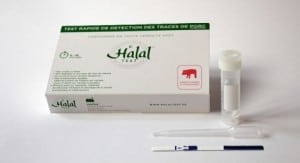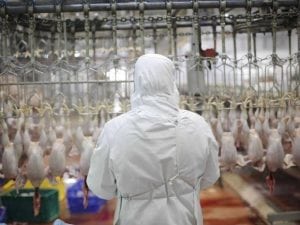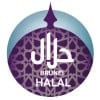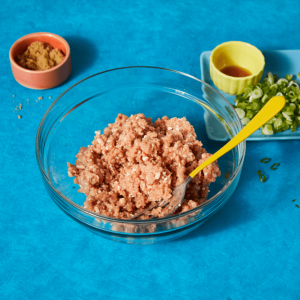
The Local.fr
A French company has developed a so-called “Halal test” which will allow Muslim consumers to detect, within a matter minutes, the presence of pork or alcohol in food.
Some have suggested it could be the latest “Made in France” success story.
Priced at €6,90 each or €125 for a packet of 25, a device, simply called “Halal test”, is designed for use by Muslims who, under the dietary requirements of their religion are forbidden from consuming pork and alcohol, Le Nouvel Observateur reported.
In a similar style to a pregnancy test, the device consists of a strip which the consumer must put into a glass of warm water containing a sample of food. After a few minutes, the test will then show one of two options: either a single bar for a negative test or two bars for a positive one, which means there is alcohol or pork present.
The test was created by the company Capital Biotech, founded by Franco-Algerian duo Abderrahmane Chaoui, a graduate in business and entrepreneur Jean-François Julien.
While no test currently exists which allows Muslims to verify if food really is Halal – i.e. it contains meat from an animal slaughtered according to Islamic ritual, Chaoui, 25, says the test is important to confirm “the absence of food products forbidden by the Koran”.
The tests will be especially helpful to Muslims when buying unlabelled food, the Algerian born Chaoui said.
“While travelling, if you go to a restaurant or order a meal to takeaway, the products aren’t always labelled,” he said.
The entrepreneurs are tapping into a potentially lucrative market. With France home to around six millions Muslims, the market for Halal food is estimated to be worth €5.5 billion a year.
Nevertheless, the business partners are optimistic that they will be able to one day create a test that will be able to determine how an animal was slaughtered based on the oxygenation of the blood.
Although Halal is a term normally applied to raw meat products, it can also refer to cooked meals, drinks, sweets and even cosmetic and pharmaceutical products.
Food falsely labelled as Halal has been at the centre of some scandals in France in recent years.
In January 2011 poultry sausages labelled as Halal from the company Knacki Herta were removed from supermarket shelves after tests revealed the presence of pork.
In deed the issue of Halal food has long been a contentious issue in France, with far right politicians repeatedly calling for public canteens not to serve Halal food and some conservative figures following suit.
Before the 2012 presidential election Nicolas Sarkozy, under pressure not to lose voters to the far-right National Front party jumped on the issue of Halal, saying that there should not be “alternative” meat options in school canteens.
In March 2013, The Local reported how Jewish and Muslim parents in the south-western town of Arveyres were outraged when their children’s school announced that the canteen would no longer be serving a substitute for pork.
More recently in July this year, a controversial ruling that ordered a French prison to serve up halal meals to inmates was overturned by a court in Lyon.



